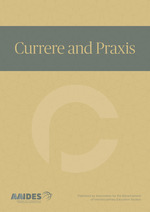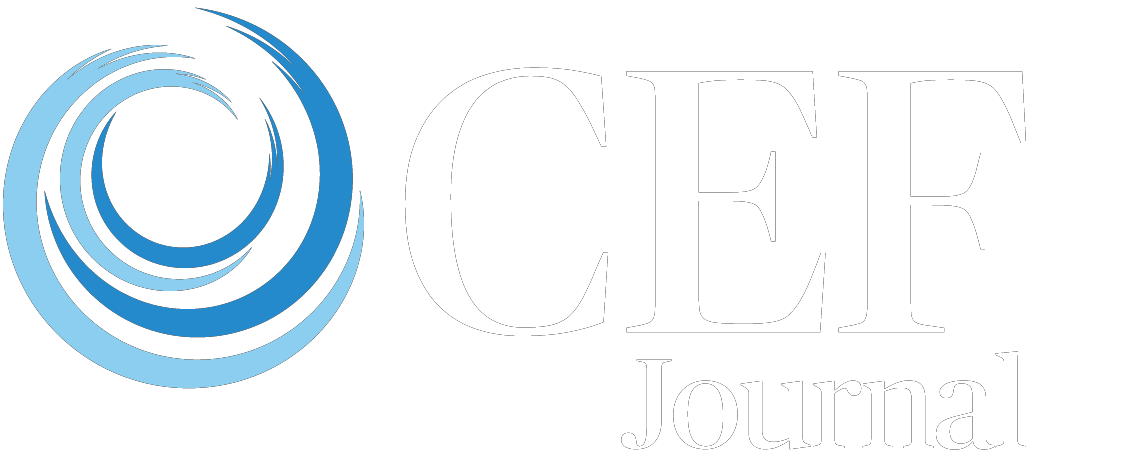Waypoints: Narrative connections for curriculum futures
DOI:
https://doi.org/10.5281/zenodo.8010032Keywords:
currere, commonplaces, narrative, curriculumAbstract
In this article, I examine the intersections between culture, education, and future through the lens of curriculum studies. Drawing upon key concepts in the field (Wearing et al., 2020), I explore the relationship between culture and curriculum and situate this relationship within the broader context of education. Schwab's four commonplaces of curriculum and Pinar’s four phases of currere guide this narrative exploration of curriculum thinking. By revisiting six key curriculum concepts, I show how connecting multiple curriculum constructs using keyword responses can be a method for curricular insight. Arguing for curriculum theory that is accessible to a broad audience of readers, I introduce "waypoints" as a conceptual tool for navigating future directions in education. The result is an inclusive and accessible curriculum approach that has the potential to engage scholars and teachers in conversations with young people about desirable futures. The article offers valuable insights into the narrative interconnections between culture, education, and future, and provides an opportunity for meaningful engagement with curriculum studies.
References
Aktan, S. (2018). Curriculum studies in Turkey: A historical perspective. Palgrave Macmillan US.
Barelli, E., Tasquier, G., Caramaschi, M., Satanassi, S., Fantini, P., Branchetti, L., & Levrini, O. (2022). Making sense of youth futures narratives: Recognition of emerging tensions in students' imagination of the future. Frontiers in Education, 7, 1-17. https://doi.org/10.3389/feduc.2022.911052
Bruner, J. (1997). The culture of education. Harvard University Press.
Bruner, J. (2004). Life as narrative. Social Research: An International Quarterly, 71(3), 691-710.
Bruner, J. (2010). Narrative, culture, and mind. In D. Bakhurst & S. Shanker (Eds.), Telling stories: Language, narrative, and social life (pp. 45-49). MIT Press.
Christou, T., & DeLuca, C. (2013). Curriculum Studies at a Crossroad: Curating Inclusive and Coherent Curriculum Conversations in Canada. Journal of the Canadian Association for Curriculum Studies, 11(1), 13–22. https://doi.org/10.7202/1022779aR
Christou, T.M., & DeLuca, C. (2019). Toward a complex coherence in the field of curriculum studies. In C. Hébert, N. Ng-A-Fook, A. Ibrahim, & B. Smith (Eds.), Internationalizing Curriculum Studies (pp. 17-32). Palgrave Macmillan.
Connelly, F. M., & Clandinin, D. J. (2000). Narrative inquiry: Experience and story in qualitative research. Jossey-Bass.
Conle, C. (2003). An anatomy of narrative curricula. Educational Researcher, 32(3), 3-15.
The Curriculum Collective. (2007). The pedagogy of hinges. Journal of the Canadian Association for Curriculum Studies, 5(2). Retrieved March 11, 2023, from https://jcacs.journals.yorku.ca/index.php/jcacs/article/view/17044
Curriculum Theory Project. (n.d.) Retrieved March 19, 2023, from https://www.lsu.edu/chse/education/research_and_outreach/curriculum_theory_project/curriculumtheoryproject.php
Bresler, L. (2006). Embodied narrative inquiry: A methodology of connection. Research Studies in Music Education, 27(1), 21-43.
Dewey, J. (1981). Experience and nature: A re-introduction. In J. Ratner (Ed.), John Dewey, the later works (Vol. 1, pp. 330-361). Carbondale, IL: Southern Illinois University Press. (Original work published n.d.).
Doll, W. E. (2008). Complexity and the culture of curriculum. Educational Philosophy and Theory, 40(1), 190-212.
Fowler, L. C. (2020). Narrative. In J. Wearing, M. Ingersoll, C. DeLuca, B. Bolden, H. Ogden, & T. M. Christou (Eds.), Key concepts in curriculum studies: Perspectives on the fundamentals (pp. 134-138). Routledge.
Gough, N. (2000). Locating curriculum studies in the global village. Journal of Curriculum Studies, 32(2), 329-342.
Grumet, M., Anderson, A., & Osmond, C. (2008). Finding form for curriculum research. In K. Gallagher (Ed.), The methodological dilemma: Creative, critical and collaborative approaches to qualitative research (pp. 136-156). Routledge.
Hébert, C., Ibrahim, A., Ng-A-Fook, N., & Smith, B. (2019). Internationalizing curriculum studies: Histories, environments, and critiques. Springer International Publishing.
Helfenbein, R. J., & Mason, T. C. (Eds.). (2012). Ethics and international curriculum work: The challenges of culture and context. Information Age Publishing.
Hlebowitsh, P. (2012). When best practices aren’t: A Schwabian perspective on teaching. Journal of Curriculum Studies, 44(1), 1-12. https://doi.org/10.1080/00220272.2011.637184
Huebner, D. (1976). The moribund curriculum field: Its wake and our work. Curriculum Inquiry, 6(2), 153-167.
Ingersoll, M., & Whitty, P. (2021). Critical narrative nostalgia: Places, spaces, and privilege. In E. Lyle & S. Mahani (Eds.), Sister scholars: Untangling issues of identity as women in academe (pp. 41-48). DIO Press.
Kanu, Y. (Ed.). (2009). Curriculum as cultural practice: Postcolonial imaginations. University of Toronto Press.
Kridel, C. A. (Ed.). (1998). Writing educational biography: Explorations in qualitative research (Vol. 13). Taylor & Francis.
Kridel, C. (Ed.). (2010). Encyclopedia of curriculum studies. SAGE Publications. https://doi.org/10.4135/9781412958806
Paraskeva, J. M. (2022). The generation of the utopia: Itinerant curriculum theory towards a ‘futurable future’. Discourse: Studies in the Cultural Politics of Education, 43(3), 446-459. https://doi.org/10.1080/01596306.2022.2030594
Luce-Kapler, R. (2020). Foreword: The curriculum of keywords. In J. Wearing, M. Ingersoll, C. DeLuca, B. Bolden, H. Ogden, & T. M. Christou (Eds.), Key concepts in curriculum studies: Perspectives on the fundamentals (pp. xiii-xvi). Routledge.
National Geographic. (2022). Navigation. Retrieved April 3, 2023, from https://education.nationalgeographic.org/resource/navigation/
National Geographic. (2022). Waypoint. Retrieved March 28, 2023, from https://education.nationalgeographic.org/resource/waypoint/
Ng-A Fook, N. (n.d.). A Canadian curriculum theory project. Retrieved March 16, 2023, from https://curriculumtheoryproject.ca/about/
Nunes, L. (2020). High School Musical—Not! In J. Wearing, M. Ingersoll, C. DeLuca, B. Bolden, H. Ogden, & T. M. Christou (Eds.), Key concepts in curriculum studies: Perspectives on the fundamentals (pp. 193-194). Routledge.
Petrina, S., Lee, Y.-L., & Feng, F. (2016). On the historiography of curriculum: The legend of Petrus Ramus. Paper presented at the annual meeting of the American Educational Research Association, Washington, DC, April 8-12, 2016.
Pinar, W. F. (2004). What is curriculum theory? (1st edition). Routledge.
Pinar, W. F. (2003). Toward the internationalization of curriculum studies. In D. Trueit, W. Doll, H. Wang, & W. Pinar (Eds.), The internationalization of curriculum studies (pp. 1–14). Peter Lang.
Pinar, W. F., Slattery, P., Reynolds, W. M., & Taubman, P. M. (1995). Understanding curriculum: An introduction to the study of historical and contemporary curriculum discourses (Vol. 17). Peter Lang.
Pinar, W.F. (2020). Currere. In J. Wearing, M. Ingersoll, C. DeLuca, B. Bolden, H. Ogden, & T. M. Christou (Eds.), Key concepts in curriculum studies: Perspectives on the Fundamentals (pp. 50-52). Routledge.
Riessman, C. K. (2020). Looking back, looking forward. Narrative Works, 10, 117-124.
Sahlberg, P. (2016). The global educational reform movement and its impact on schooling. In K. Mundy, A. Green, B. Lingard, & A. Verger (Eds.), Handbook of global education policy (pp. 128-144). John Wiley & Sons.
Sanson, A., & Bellemo, M. (2021). Children and youth in the climate crisis. BJPsych bulletin, 45(4), 205-209. https://doi.org/10.1192/bjb.2021.18
Seaman, J., & Nelsen, P.J. (2011). An overburdened term: Dewey's concept of “experience” as curriculum theory. Education and Culture, 27(1), 5-25.
Schubert, W. H. (2008). Curriculum inquiry. In F. M. Connelly, M. F. He, & J. Phillion (Eds.), The SAGE Handbook of Curriculum and Instruction (pp. 399–419). Thousand Oaks, CA: Sage.
Schubert, W.H. (2010). Journeys of expansion and synopsis: Tensions in books that shaped curriculum inquiry, 1968–Present. Curriculum Inquiry, 40, 17-94.
Schwab, J. J. (1970). The practical: A language for curriculum. The School Review, 78(1), 1–23.
Sonu, D. (2020). Social Justice. In J. Wearing, M. Ingersoll, C. DeLuca, B. Bolden, H. Ogden, & T. M. Christou (Eds.), Key concepts in curriculum studies: Perspectives on the fundamentals (pp. 187-192). Routledge.
Wearing, J., Ingersoll, M., DeLuca, C., Bolden, B., Ogden, H., & Christou, T. M. (Eds.). (2020). Key concepts in curriculum studies: Perspectives on the fundamentals. Routledge.
Yaşar, C. G., & Aslan, B. (2021). Curriculum theory: A review study. International Journal of Curriculum and Instructional Studies, 11(2), 237-260. https://doi.org/10.31704/ijocis.2021.012
Downloads
Published
How to Cite
Issue
Section
License
Copyright (c) 2023 Association for the Advancement of Interdisciplinary Education Studies

This work is licensed under a Creative Commons Attribution-NonCommercial-NoDerivatives 4.0 International License.









